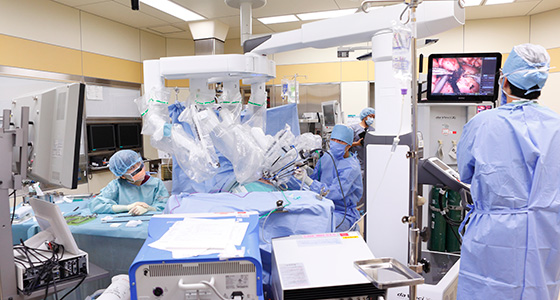- HOME
- Department
- Prostate Center
-
Related Links
Prostate Center

Overview
The department handles prostatic disease overall, but the two main diseases are prostatic hyperplasia and prostate cancer.
Prostatic hyperplasia
- Diagnosis/Testing
The degree of severity is determined using a survey (IPSS or QOL) on subjective symptoms. Objectively, a urine flow meter is used to measure the flow of the urine and the time required for urination. In addition, the size of the prostate and residual urine volume is checked using ultrasound. A blood test is used to confirm that there is no rise in prostate-specific antigen (PSA) and to rule out the possibility of it being a complication of prostate cancer. - Medical Treatment
There are drugs that alleviate the tension of the prostatic urethra and drugs that somewhat shrink the prostate itself. - Surgical Treatment
Surgical treatment is conducted if medical treatment is not effective. Recently, methods that involve making an open incision, in order words, making an incision in the lower abdomen and removing the prostatic glandular tissue are hardly ever used. Transurethral endoscopic treatment where an endoscope is inserted through the urethra is now the norm. The conventional method known as TUR-P involves using the same heat source for resection as an electric scalpel.
Recently, we have mainly been using a method of resection using lasers (known as HoLEP). With this method, there is little bleeding accompanying surgery, and transfusion is not required. There are also not many other complications, and the length of time that the catheter that is placed in the urethra after surgery remains in the urethra has also been shortened. Therefore, it can be said to be a treatment method that places little burden on the body, and requires only a short period of hospitalization, unlike the conventional TUR-P method.
Prostate Cancer
- Diagnosis/Testing
Prostate specific antigen (PSA) levels are confirmed using a blood test. With advanced cancer, cancer can be detected through palpation, but with early stage cancer, determining the presence of cancer with palpation is difficult.
Other than cancer, a rise in PSA is also seen with prostatic hyperplasia and inflammation. MRI is an effective imaging test. The definitive presence or absence of cancer is determined by actually inserting a needle and testing the prostatic tissue (prostate needle biopsy). If diagnosed with cancer, tests such as a CT scan and bone scintigraphy are conducted to determine whether the cancer has metastasized. - Medical Treatment
Mainly for elderly patients aged 80 and above and patients with advanced cancer. As prostrate cancer proliferates under the influence of male hormones, a medication that shuts off these hormones is injected or administered orally in treatment. - Surgical Treatment
Cancer that has not metastasized and is localized in the prostate is the target for treatment. Until now, the department had conducted surgery that involved making a small horizontal incision above the pubic bone. In December 2015, the da Vinci Xi, the newest model in the world at the time, was introduced, and in 2016, 147 robot-assisted surgeries were conducted, and the department is steadily accumulating experience. - Radiation Therapy
Like surgical treatment, cancer that has not metastasized and is localized in the prostate is the target for treatment. IMRT finally became eligible for insurance coverage at our hospital from May 2016.
Message for Our Patients
In our department and Center, we practice team medicine, striving to build a system that enables patients to securely undergo surgery and treatment. If you wish to have cancer surgery, please bring a referral from your previous referring physician, and if possible please also bring your most recent diagnostic imaging materials and pathological diagnostic materials.
Patients who have a medication record handbook are asked to bring it with them. This is because depending on the medication you are taking, such as medication that keeps your blood from clotting, it may lead to bleeding during surgery. At our department and Center, a pharmacist will be involved in confirming the medication you are taking prior to your surgery, and if you have your medication record handbook with you, it should enable your treatment to progress smoothly.
